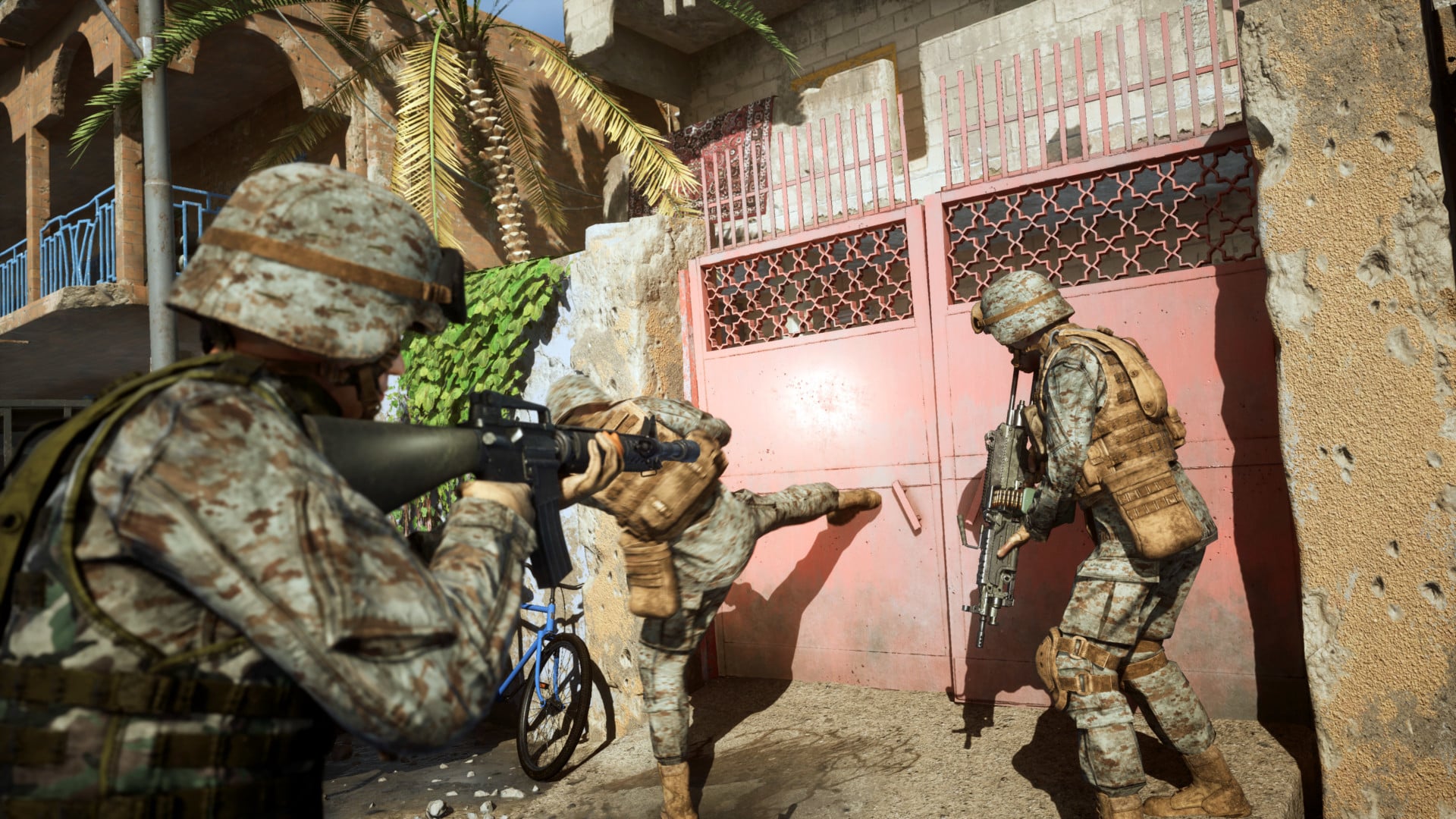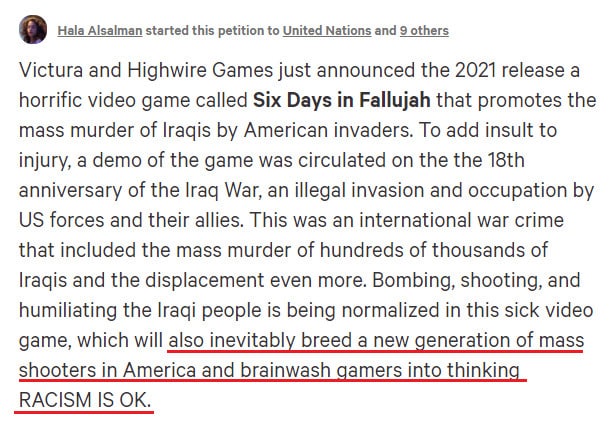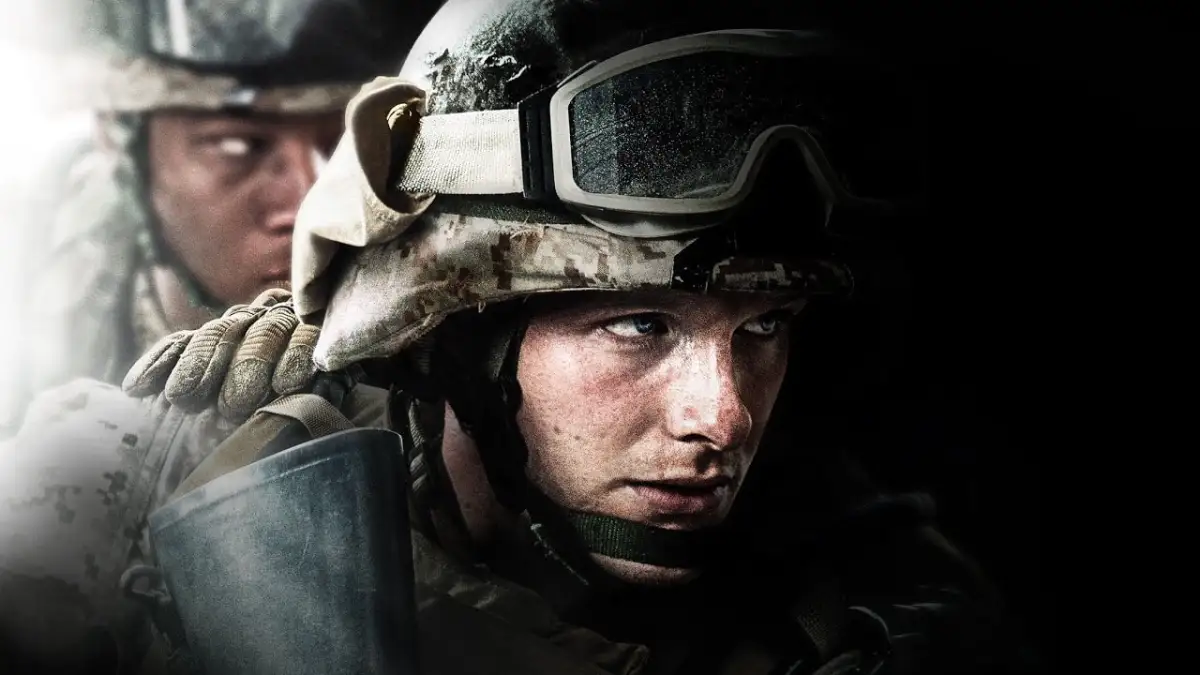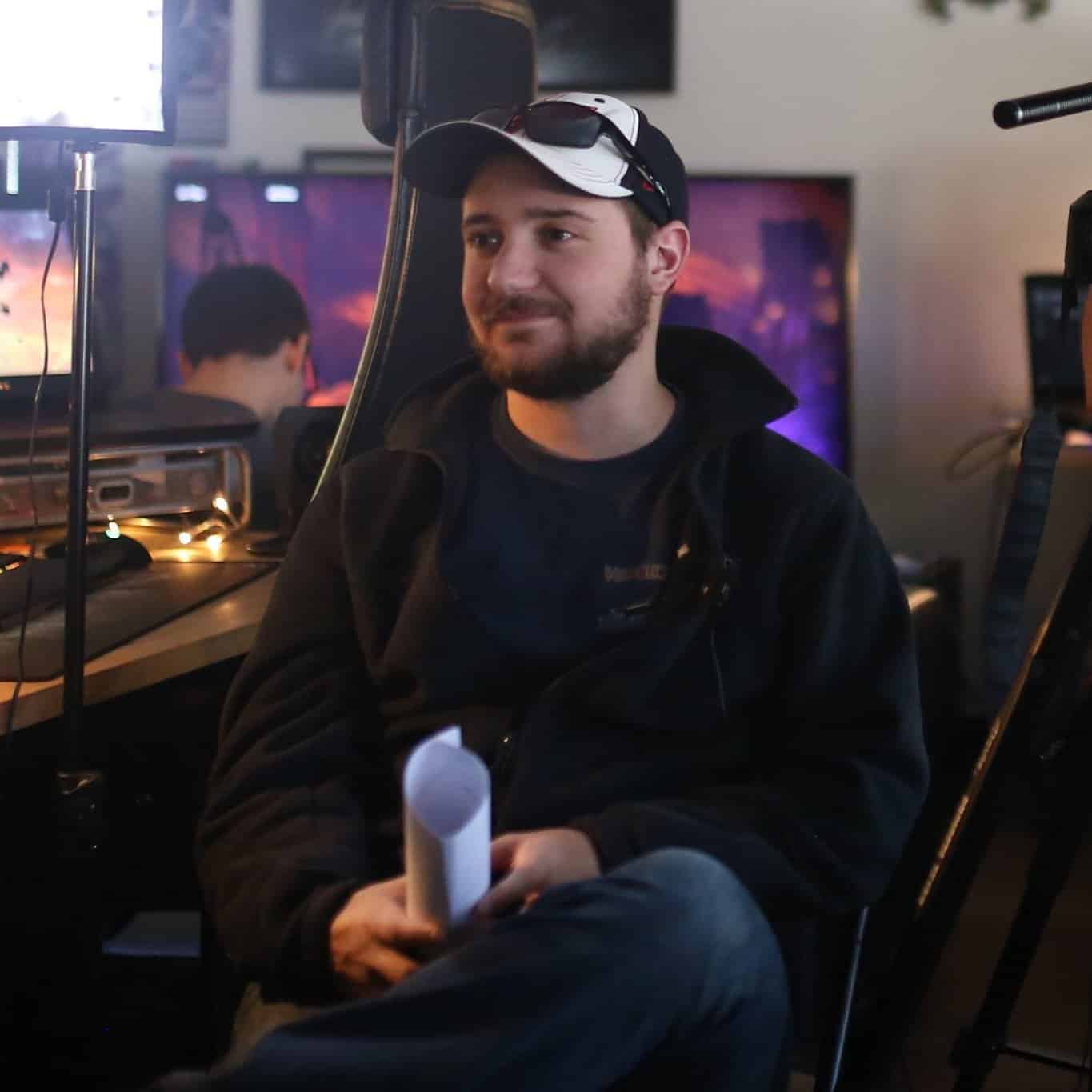The way Six Days in Fallujah is being marketed is not helping itself. Victura CEO Peter Tamte seems conflicted in all the interviews he’s done on how to market it, and Highwire Games creative director Jaime Griesemer openly indicated in an IGN Unfiltered interview that they really don’t know how to market it. Tamte keeps going to interviews to portray this game as a “realistic tactical shooter.” This is in direct conflict with the fact that they’re trying to share the personal stories of people directly affected by the battle via an interactive documentary.
If this game is indeed that, then it’s a mistake to continue marketing it in a way that’s focusing on the violence and how cool combat is. Realistic shooting mechanics, a squad command system, and how they’re procedurally generating maps to provide a different combat experience each time have nothing to do with telling intimate stories.
Victura and Highwire are treating Six Days in Fallujah as if it’s any other FPS game, when it’s clearly not.
The developers are being rightfully criticized for sensationalized depictions of Six Days in Fallujah. Griesemer says they want games to “grow up,” so their messaging needs to grow up too. Sell it on the merit of telling true stories, providing unique viewpoints from the people involved. This is something Griesemer seems to understand in the IGN Unfiltered interview, lending to a sense of unease I felt watching it as Tamte and Griesemer almost seem to be marketing two different experiences.
If all you’re going to do is market the game as this cool simulation into what combat was like for a game set in a nonfictional setting where real people fought and died, including complaining that nobody in the media paid attention to the destruction tech in the original version of the game (really?), then all the criticism Highwire and Tamte are currently receiving is rightfully deserved.

That all being said, I can’t get on board with the petition currently making the rounds on the internet calling for the banning of this game. I absolutely think the people that took part in this battle, the people that suffered because of it, all deserve to have their stories told if that’s what they want to happen.
The petition is aimed at the United Nations, President Biden (who voted for the war, mind you), Microsoft, Sony, and many more to ban this game or make sure it’s not listed on their storefronts, based on the notion that it will spawn the next generation of mass shooters and racism. It has been signed by a number of developers who themselves work on games such as Rainbow Six Siege and Medal of Honor: Above and Beyond, the latter of which also utilized a documentary within the game.
The petition and the way it’s worded is reductive and shortsighted, and quite frankly, it gives the politicians that want to regulate art a free pass when the developers themselves are supporting this argument that has been debunked time and time again, even by the ESA that lobbies on the behalf of video games.
Even more concerning is the amount of game developers that signed this petition, and once the makers of the petition caught wind of the criticism of the way it was worded, they went back and changed the wording of a petition that was already signed. That’s a whole other debate within itself, but it just illustrates that people most likely weren’t even reading what they were signing before signing it, even if there are valid complaints within it.

We don’t stop people from sharing their stories in books, movies, or art, and if games are truly art, then treating it differently is regressive. There’s an argument to be had about games making a player an active participant in telling these stories, but Griesemer is right in that games so far really haven’t even tried.
People keep bringing up the distinction between fiction and nonfiction games in this conversation about Six Days in Fallujah, but it’s a cop-out. Call of Duty: Modern Warfare may be set in a fictional world, but is it really “fictional” if all the game does is change around a few letters in the terrorist organization Al-Qaeda to Al-Qatala?
In Call of Duty you’re given a free pass because it’s fictional. As a player, you’re not expected to think about the actions you’re committing or whom you’re committing them against. Six Days, if communicated right, is putting players in a real setting, with real people and real stories, and that holds an entirely different weight to just shooting at some random faceless character.
Could Six Days in Fallujah just be another game that glorifies war and violence? It certainly can be. Could it whitewash the Battle of Fallujah and leave out a lot of important facts about the atrocities that went down there? Absolutely. By their own admission in interviews, they won’t be showing or participating in atrocities, but the game doesn’t need to show those things if it’s going to talk about them, which the game’s own website’s FAQ indicates it will.

For all we know, Six Days in Fallujah could very well provide us with a unique experience that shows the true human cost of war in a very real way. In every war game we play, we play fictional characters in settings “inspired” by real places and real people. And these games are often just viewed as fun, high-octane interactive action movies with nothing to really “say” about the cost of war, other than guns are cool and, hey, if you rack up X amount of kills you can drop a nuke on your friends.
How are we to know what kind of experience Six Days in Fallujah will provide if the first thing that happens is we try to ban it? In our interview with Jörg Friedrich, I specifically brought up that if Spec Ops: The Line were announced today and marketed the way it was back in 2009, I bet many of the same criticisms and outrage would be levied at it that we’re seeing today, maybe even calls for a ban. Who knows?
Watch this trailer and tell me if it’s truly indicative of the experience that Spec Ops: The Line ended up providing.
Let’s not forget either that a big “selling point” of Spec Ops: The Line at the time was… sand tech.
Again, all of the complaints currently being levied at Six Days in Fallujah are valid, and the developers at Highwire and other developers working on similar projects should be listening to those complaints and addressing them. So far, they have failed to do so, in my opinion.
I myself feel uncomfortable with the game and how it’s seemingly putting a realistic combat experience above all else. It does feel gross, and I have no problem admitting that. At the same time, I do want to hear the stories of the people from this event, especially those from Iraq. Why it has to be another shooter though, well, the developers said it themselves — that’s what sells. Whether you agree with that or not, it’s a fact.
I absolutely empathize with the people that are concerned about this game, how it will portray an extremely controversial event in history, and how games have continually presented people from the Middle East. While Tamte says that not enough people would be interested in playing a game from an Iraqi civilian’s perspective, I believe he’s very much incorrect on that, and it’s a shame they didn’t use this opportunity to serve that purpose further before marketing the next “tactical shooter.”
It’s possible that Highwire Games might not be the right studio to make this, it’s quite possible that it may not have the intended effect they’re hoping for it to have, but I still think they have every right to try. Games about war have glorified violence for so long, and it’s only every once in a while that we get games like Spec Ops: The Line or This War of Mine that truly have something to say about it — and even then they’re fictional experiences. Maybe Six Days in Fallujah will be another project that truly does take war and the costs of it seriously and provides that unique perspective from real people we get so very little of in games.
Getting games banned by the government probably isn’t a path this industry wants to head down. The game may fail at its stated goals and be everything that people are worried about it being — or it may not. We really don’t know until it’s out and we’re able to judge it in full. And for those that do give it that chance, you had better understand that this is supposed to be a documentary about a real event, with real people, and that it can and will be judged on how truthfully that story is told.
If it’s just another game to you, then you probably shouldn’t experience it.






Published: Apr 10, 2021 12:49 pm